How Do Dental Braces Improve Dental Health Long-Term?
Many people ask, how do braces improve dental health long-term? While braces are often seen as a cosmetic Dental Braces treatment to straighten teeth and enhance smiles, their benefits go far beyond aesthetics. Properly aligned teeth contribute significantly to oral health, function, and overall well-being. By correcting misaligned teeth and bite issues, braces promote healthier teeth and gums, reduce risks of dental problems, and support long-lasting oral health.
Correcting Misalignment and Improving Bite Function:
One of the primary ways braces improve dental health long-term is by fixing teeth misalignment and bite problems such as overbite, underbite, and crossbite. When teeth are properly aligned:
Chewing and biting become more efficient, reducing strain on jaw muscles and joints
Teeth fit together evenly, minimizing abnormal wear and tear on enamel
Jaw joints experience less stress, lowering the risk of temporomandibular joint (TMJ) disorders
Proper bite reduces risk of injuries from protruding teeth
Correcting these issues with braces supports better function and comfort for years to come.
Reducing the Risk of Tooth Decay and Gum Disease:
Misaligned teeth can create tight spaces and overlaps that are difficult to clean, making it easier for plaque and bacteria to accumulate. Braces help by:
Straightening teeth to allow for easier and more effective brushing and flossing
Reducing areas where food particles can get trapped and cause decay
Helping prevent the development of gum inflammation and periodontal disease by improving gum health
Promoting better saliva flow around all teeth surfaces, which naturally fights bacteria
By facilitating better oral hygiene, braces decrease the risk of cavities and gum disease over time.
Preventing Jaw Problems and Tooth Damage:
Braces not only improve the position of teeth but also help balance jaw alignment. This has important long-term dental health benefits such as:
Preventing uneven pressure that causes premature tooth wear or chipping
Reducing the likelihood of jaw pain, headaches, or TMJ disorders linked to misaligned bites
Avoiding excessive strain on specific teeth that can lead to fractures or mobility issues
Proper jaw and tooth alignment achieved through braces help preserve natural teeth and jaw function for life.
Enhancing Speech and Digestion:
Properly aligned teeth contribute to clearer speech and more effective digestion. Braces can:
Correct speech impediments caused by teeth or jaw misalignment, improving communication
Allow better chewing of food, which is the first essential step in digestion
Reduce risk of digestive problems caused by insufficiently chewed food
These improvements support overall health and quality of life well beyond just oral benefits.
Boosting Self-Confidence and Mental Health:
Though not a direct dental health benefit, the confidence gained from a well-aligned smile positively affects mental and emotional well-being. Feeling good about your smile encourages better oral care habits and promotes social interactions, which indirectly support long-term dental health.
Long-Term Commitment to Dental Care Post-Braces:
To fully enjoy the long-term dental health benefits of Dental Braces Treatment, it’s important to:
Maintain excellent oral hygiene with regular brushing, flossing, and dental check-ups
Use retainers as prescribed to keep teeth in their new positions
Visit your orthodontist for follow-up care to monitor stability and address any issues
Avoid habits that can damage teeth such as grinding or nail biting
Braces lay the foundation for a healthy smile, but ongoing care is essential for lasting results.
In summary, braces improve dental health long-term by aligning teeth and jaws, enhancing oral hygiene, preventing damage and disease, and supporting overall function and confidence. Investing in orthodontic treatment is an investment in your lifelong dental wellness.
